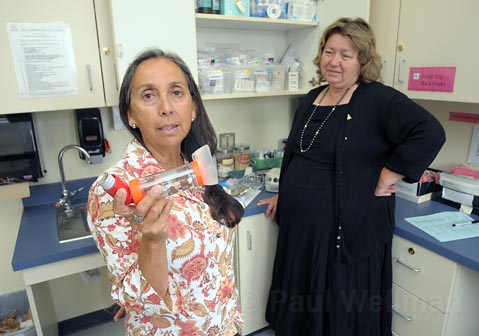School Health Offices Could Close Early Next Year
Carefree-And Not in the Good Way

Health assistants, the modern-day version of the school nurse, will spend fewer hours on Santa Barbara’s campuses if two budget cuts approved by the school district’s board last month are sustained in upcoming negotiations with California School Employees Association.
Known for bandaging cuts and dispensing medication, the district’s 19 health assistants are actually trained to handle the range of health issues that can arise in school settings, including life-threatening allergic reactions, asthma attacks, immunization regulations, and adolescent angst. But the district’s response to Governor Arnold Schwarzenegger’s multibillion billion dollar deficit reduction plan could force some Santa Barbara school health offices to close an hour to two hours before classes end, leaving any potential emergencies in the laps of office staff at elementary, junior, and senior high schools. Debbie Pentland, a certified, registered school nurse who supervises the districts’ three additional registered nurses (RNs) and the health assistants that work under them, said the board’s decision is dicey.
“Anyone who walks in the shoes of a health assistant will know it’s a lot harder a job than it looks,” she said. “We have a bare-bones department as it is and we’ve kept a lot of kids safe.” Ten percent of district students have asthma, Pentland said, 27 are known insulin-dependent diabetics. Two need monitoring for their liver transplants. At La Colina Junior High alone, seven children have a life-threatening allergy with the potential to trigger anaphylactic shock.
Schwarzenegger’s deficit reduction plan calls for $4.8 billion in cuts to public education this year and next. Santa Barbara School District was compelled to eliminate $4 million from next year’s budget. District administrators said reductions in clerical and support positions-a category that includes health assistants-haven’t kept pace with recent enrollment declines and proposed aligning health assistants’ hours to numbers of students at individual schools. For example, with just 368 kids, Cleveland Elementary health assistant Silvia Gutierrez’s day could shrink from six hours-which corresponds roughly to the number of hours children are in class-to four hours. The district only has one only fulltime health assistant, at Franklin, who would go down to six hours daily. The year-round schools would have no health assistant during the intercession periods, when remedial and enrichment classes occur.

District Superintendent Brian Sarvis would not hazard a prediction as to what might emerge from district negotiations with the California School Employee Association. Waxing optimistic, he proffered a hope that the required savings, which amount to $87,150, could be achieved in golden handshakes and attrition instead of cutting the hours. “We could hit that number in any number of ways,” he said.
The only vote against reducing health assistants’ hours came from school boardmember Bob Noel. “It’s a matter of managing risk,” he said. “There are a lot of kids out there and there are a lot of different medical conditions.” Boardmember Nancy Harter viewed the vote from a different perspective. “When you vote for something like that, you’re not really voting for it, but recognizing that cuts have to be made,” she said. “Everybody will have to be more alert, particularly in the case of younger students.” She said the state is supposed to reimburse the district for care given Medi-Cal eligible students, but that those payments either lag or don’t come at all.
When an emergency occurs that exceeds a health assistants’ skill level-some of the assistants are Licensed Vocational Nurses, some have specialized instruction-they assess whether to call a supervising RN or 911. Pentland predicted that if care is consigned to clerical staff, 911 is likely to be mobilized more often. Harter acknowledged the inefficiency of such a development, but added, “As a local School Board member, I don’t have control over that. I don’t have a budget for healthcare.”



